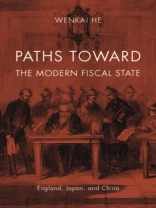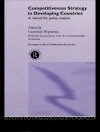The rise of modern public finance revolutionized political economy. As governments learned to invest tax revenue in the long-term financial resources of the market, they vastly increased their administrative power and gained the ability to use fiscal, monetary, and financial policy to manage their economies. But why did the modern fiscal state emerge in some places and not in others? In approaching this question, Wenkai He compares the paths of three different nations—England, Japan, and China—to discover why some governments developed the tools and institutions of modern public finance, while others, facing similar circumstances, failed to do so.
Focusing on three key periods of institutional development—the decades after the English Civil Wars, the Meiji Restoration, and the Taiping Rebellion—He demonstrates how each event precipitated a collapse of the existing institutions of public finance. Facing urgent calls for revenue, each government searched for new ways to make up the shortfall. These experiments took varied forms, from new methods of taxation to new credit arrangements. Yet, while England and Japan learned from their successes and failures how to deploy the tools of modern public finance and equipped themselves to become world powers, China did not. He’s comparative historical analysis isolates the nature of the credit crisis confronting each state as the crucial factor in determining its specific trajectory. This perceptive and persuasive explanation for China’s failure at a critical moment in its history illuminates one of the most important but least understood transformations of the modern world.
Wenkai He
Paths toward the Modern Fiscal State [EPUB ebook]
England, Japan, and China
Paths toward the Modern Fiscal State [EPUB ebook]
England, Japan, and China
购买此电子书可免费获赠一本!
格式 EPUB ● 网页 290 ● ISBN 9780674074651 ● 出版者 Harvard University Press ● 发布时间 2013 ● 下载 3 时 ● 货币 EUR ● ID 4956613 ● 复制保护 Adobe DRM
需要具备DRM功能的电子书阅读器












